March 29, 2020
Experimental Fiction: Examples and Dynamics
Experimental fiction examples aren’t easy to find. The thing is, experimental fiction is the kind of writing that rarely produces a commercial hit – though it does so every now and then.
Imagine literary fiction on LSD, and you have something like experimental fiction. But no, not all experimental fiction is literary – and certainly most of literary fiction isn’t experimental.
A definition of experimental fiction isn’t easy, either. In some sense, experimental fiction is the kind of fiction that displays significant deviation from literary norms – mostly in structural, formatting, or methodological aspects. We’ll see more about all these in a moment, through the examples I’ve picked.
At the same time, we must also recognize an interesting paradox: Whether a novel is experimental or not must be seen in connection with its context. In other words, what is groundbreaking, radical, and unorthodox today, might be the norm tomorrow.
For some, experimental fiction is “weird”. For others, it’s “awesome”. As for me, it’s an interesting opportunity to learn a thing or two about how fiction, writing, and even literary criticism operate.
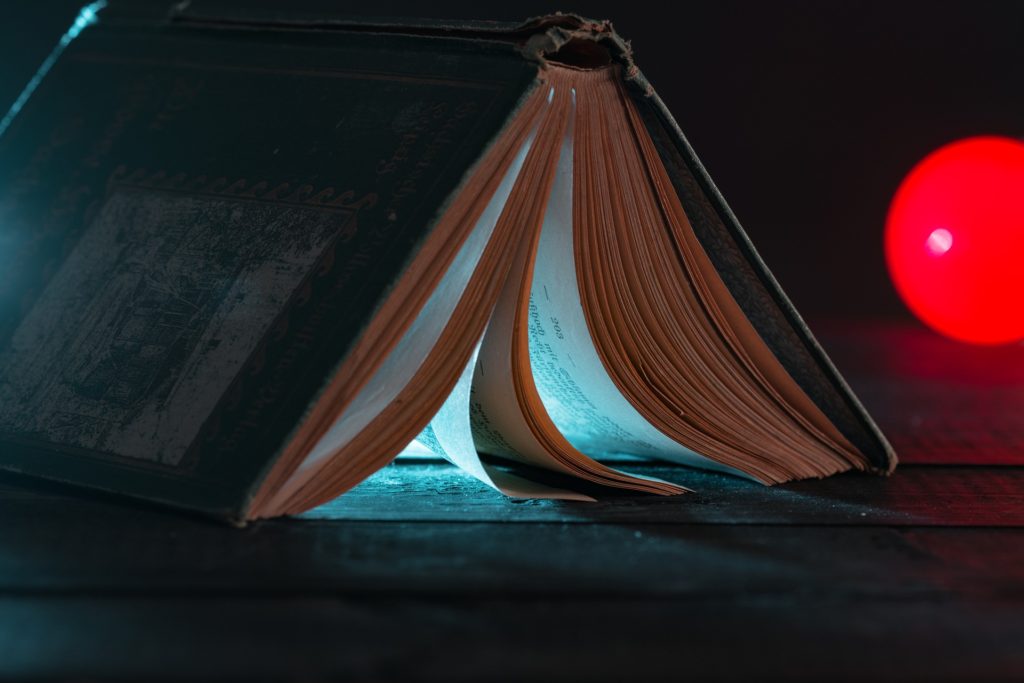
Examples of Experimental Fiction
I’m a great fan of examples – they make it easy to immediately picture something. This is especially the case with difficult or vague concepts. And, I assure you, experimental fiction is such a concept.
Therefore, I have put together a list of three novels that exemplify this kind of writing. I’ve read all three of them. One I liked a lot, one I hated, and one I enjoyed more about its how than about its what – which is a major sign of experimental fiction, as we’ll see in more detail below.
The three novels in question are The Raw Shark Texts, Beautiful Losers, and House of Leaves. As I said, every now and then you do get some commercial hits, too. Let’s take a look at these novels one by one, to see how experimental fiction looks like. Afterward, we’ll talk about the how’s and why’s of the genreIs it a genre or a mode? That is a difficult question to which I don’t have a clear answer. I would favor "mode", but I’m open to discussions on the matter. For more on genre vs mode, also look at my post on Gothic vs science fiction and horror..
The Raw Shark Texts: Text, Concept, Writer, Reader
The plot of The Raw Shark Texts is fairly simple, on the surface. Eric Sanderson, suffering from what appears to be a rare form of amnesia, discovers a note from a previous instance of himself, addressed to himself. He begins to follow the clues and enters a world where words and text can take the form of a conceptual shark and kill you.
If that sounds crazy alright, wait till you see the book.
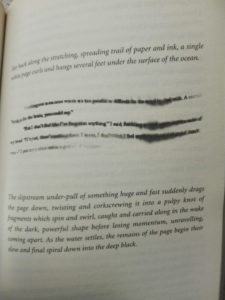
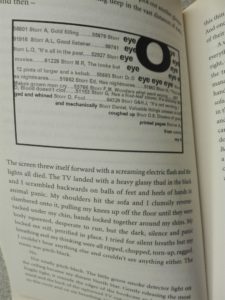
Yes, that’s a shark made of words there. And guess what, it’s also moving. You read that right; a physical book, made of printed text, can show a shark – made of printed text – move toward you. Here’s how:
The whole point about The Raw Shark Texts and its experimental nature is to draw attention to the power of words. Particularly, the novel makes a compelling case about how we approach (and formulate) reality in a way that, though subjective, has very objective consequences.
Beautiful Losers: Hey, Where Are the Paragraphs?
Leonard Cohen… His music, I like; his writing, not so much. If I recall correctly, Beautiful Losers was written under the Greek summer sun on the lovely island of Hydra. It was also written under… the influence, which clearly shows, as you can see in these excerpts:
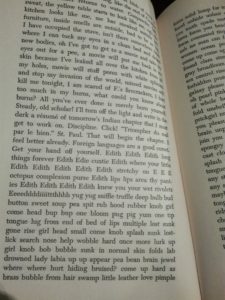
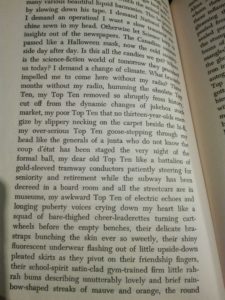
It’s not so much the lack of paragraphs (not all the book is like that, but some of it is), but just the fact that there’s so little to grab onto. The Raw Shark Texts had a plot and some sort of evolution; Beautiful Losers, far less so.
Come to think of it, Beautiful Losers reminds me of some results I got using my JavaScript random text generator. Though, actually, the random text generator was probably more coherent!
House of Leaves; or, Mercilessly Mocking the Academia
This last example of experimental fiction is my favorite, though not because of the book itself. I did enjoy House of Leaves – though not as much as The Raw Shark Texts, which was far more philosophical and speculative in a purely artistic wayThis is a subtle issue, and difficult to properly explain without you having read the books. Very simply, I mean that The Raw Shark Texts engaged the reader in a philosophical discussion without doing it directly or overtly; merely as a consequence of its form. Conversely, House of Leaves, by paying excessive attention to concepts such as academic criticism, journalism, and generally our record-obsessed culture, leaves far less room for ambiguity, artistry, and reader-based interpretation..
House of Leaves I enjoyed because it mercilessly mocks the academia. It taunts criticismThis includes the present post, in a way! It takes a brilliant mind to actually anticipate criticism and preemptively absorb it into the literary product. I know, because I’ve done it myself with one of my novels (besides brilliant I’m also very modest, what can I say…). It exposes the clinical, hopelessly boring deconstruction of art that has become a self-sustaining process, having become so engorged with the blood of artists that it’s about to burst in a supernova of amusing gore.
In plain English, House of Leaves shows how hopelessly out of touch with reality modern intelligentsia can be.
How?
It basically takes a horror story – where the house of a family isn’t what it seems – and through a very complex series of (entirely fictitious) interviews, pieces of research, books, videos, and what not, it creates an echo that’s supposed to assign authenticity to the whole thing, only it does the exact opposite. It’s the “Blair Witch Project genre”, basically.
Moreover, and more crucially, it precisely exposes academia for what it is, by showing all these (fictitious) researchers approaching with excessively dry and clinical methods events that are inherently emotional.
To do that, House of Leaves deploys the most bizarre formatting you’ve ever seen.
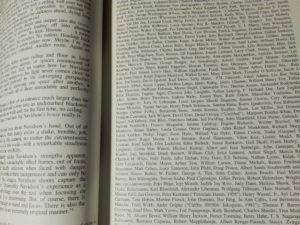
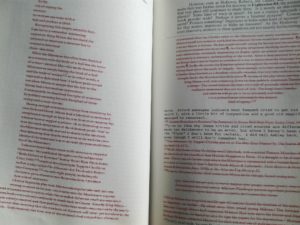
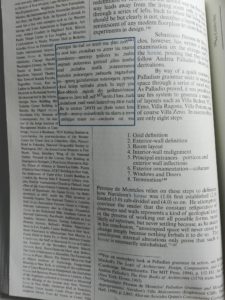
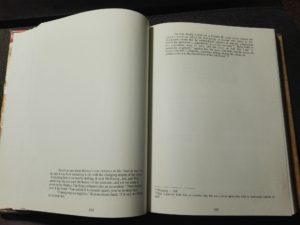
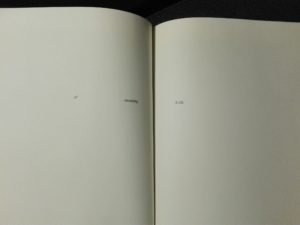
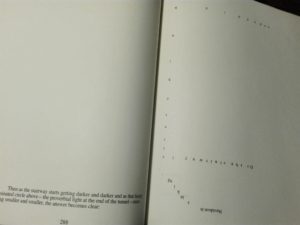
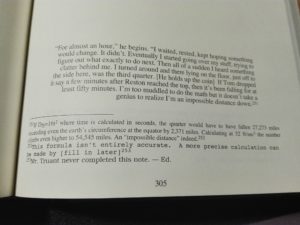
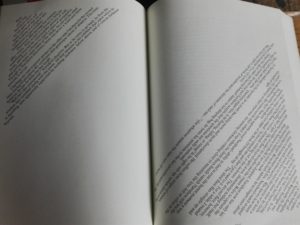
I particularly liked the instance where there is a footnote, which itself contains a footnote, which itself contains yet a third footnote.
The book is 600 pages long. If we only kept the “basic story”, formatted traditionally, the book would probably be 60-70 pages long.
What Is the Purpose of Experimental Fiction?
In its most basic form, experimental fiction is about drawing attention. If the author is skillful, this isn’t merely about drawing attention in general, but about drawing attention to specific processes – mostly in regard to reading, writing, literature, and the dissemination of information.
Experimental fiction is an auto-referential process.
If the author is really skillful, then the final product is also perfectly readable and enjoyable – I’d characterize The Raw Shark Texts as such an example; House of Leaves less so, and Beautiful Losers not at all.
Another option is when a book becomes partially – that is, to an extent – experimental by… accident. This is usually a result of the novel escaping the author’s conscious control.
Issues of Historical Context
Bram Stoker’s Dracula would be a fantastic such example. To us today it might not seem all that experimental, but for the late-1800s Victorian audience, the merging of Gothic elements with modernity and the “upgrading” of the epistolary forms to include phonographs, photos, and other media, was surely unorthodox.
Another example would be Mary Shelley’s Frankenstein. As I mentioned in my post on 3 Gothic characters with a secret:
[I]n the general complexity of the plot, with stories within stories and horrifying events easily attracting all the attention, few readers realize the importance of [Margaret Saville] for the narrative: “[A]s the designated recipient of her brother’s writings, she will ultimately hold Robert’s letters which contain Victor’s story which contains the monster’s story which includes the story of the DeLacy’s [sic]” (Dickerson, Vanessa D. “The Ghost of a Self: Female Identity in Mary Shelley’s Frankenstein”. Journal of Popular Culture. 27.3. 1993. p.84).
It is a remarkable realization, that the entire narrative is dependent on the hands of a woman. Furthermore, the lack of an omniscient narrator in Frankenstein leaves open all possibilities, including the one that the text of Frankenstein is, after all, edited by none other than Margaret Saville herself. Extending the skeptical hypothesis to its opposite limits, there is nothing to prove Margaret’s existence in the first place. She could as well be a creation of Robert’s imagination, just like the entire narrative. The metatextual twist is, of course, that the entire narrative is a product of the imagination, namely Mary Shelley’s – who shares the same initials as Walton’s sister, MS.
Again, Frankenstein doesn’t seem all that experimental to us today. Perhaps not even at its own time. And yet, this auto-referential essence that we saw in more recent (and more… traditionally experimental) works is obvious.
Experimental Fiction Is a Discourse of Doubt
You might like it or hate it – I did hate Beautiful Losers. But one thing’s for certain: Experimental fiction will make you feel something.
This is already a big deal.
In a literary world full of pointlessness and regurgitation, authenticity is always welcome. Sometimes it doesn’t work – to some people at least – but the effort is always worth it.
On the other hand, the examples of experimental fiction I showed you in this post are the exception rather than the rule, when it comes to commercial viability. If you care about making money from writing books (I certainly don’t), I doubt experimental fiction is the way to go.
I’ve written some experimental fiction myself – the Self Versus Self project. Not only does it come in two volumes – one narrative poetry, one a novel – that somewhat narrate the same plot, but even the novel itself is not quite traditional. Here’s what I said about it in the post linked above:
[Self Versus Self] contains various forms of texts, from Instagram hashtags to twitter comments and from news reports to journal entries. It also contains stories within stories, and some experienced readers will surely notice many other details, all related to the writing process itself. Is the work self-referential? You bet.
It’s all about challenging your preconceptions.
What is art?
What is criticism?
Why should you care?
And, in the words of one of the characters of Self Versus Self, there are no answers; but there are always questions.
I don't show you ads or newsletter pop-ups; everything is offered for free. Wanna help support a human internet?
